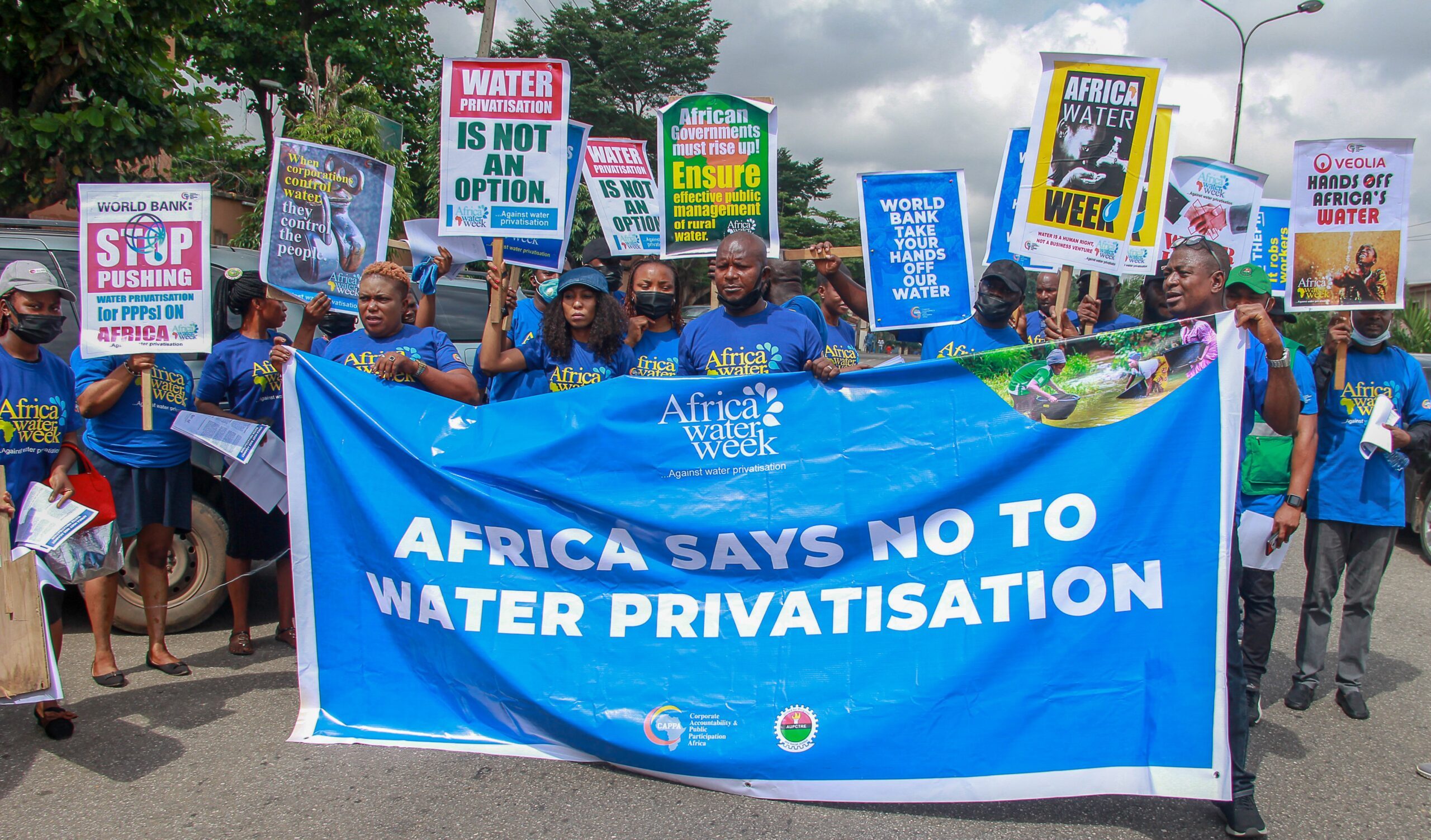No Money, No Water, No life’
Introduction
The ‘water question concentrates and reflects within itself all the elements of exploitation, oppression and discrimination’ that characterise our societies. It is no exaggeration to say that ‘the quality and condition of our whole society’ (whether national or international) ‘depends on water’.
In South Africa, the realities of the long-running water crises have been and continue to be, driven by a neoliberal policy approach which is framed by multiple forms of water privatisation. Indeed, the lived realities of the majority – urban and rural workers, small-scale farmers, unemployed women and youth, city slum dwellers and mining communities – are about marginalisation, disrespect, dispossession, conflict and violence, but also resistance.
The cumulative result over the last couple of decades or so in South Africa and indeed across the African continent, has been that poor/working class urban and rural communities suffer the most direct consequences, while also being the most direct ‘engagers’ with and resistors to, these multiple crises. It is the combined ‘stories’ that speak to these realities which this article surfaces.
The realities of the water crisis
According to the United Nations World Water Development Report, which was issued in early 2023, there are around 2 billion people (25% of the world’s population) who do not have access to clean/safe drinking water, while 46% lack adequate sanitation services. It is predicted that within the next 2 years, almost 70% of the world’s population will experience shortages of clean water.
For the African continent the situation is even worse. Just under 50% of the population of sub-Saharan African have no access to safe drinking water, while 35% have no access to any basic drinking water services.
When it comes to South Africa, there was substantial progress in the first two decades after 1994 which saw the percentage of households with (formal) access to clean water increasing from 67% to an estimated 96% in 2018. However, at the same time and especially in the last several years, the reliability of water services and infrastructure as well as the state of water governance and infrastructural maintenance has been deteriorating rapidly.
So much so that by 2018 the percentage of households with (actual) reliable and safe water supply services decreased by 64%. Additionally, over 26% of all schools (urban or rural), and 45% of clinics have no access to water.
But there is more to these crises. Water access and affordability issues are closely related to a range of community issues around the provision of basic services, food, health, housing, land as well as gender based violence. Further, water is central to larger crises such as the climate crisis and armed conflict. At the heart of these multi-sided crises is the ideology and practice of capitalist neoliberalism.
The triumph and tribulations of neoliberal water policy
In 1994, when the African National Congress (ANC) came to power in South Africa’s first democratic elections, there were high expectations amongst many that it would honour the popular demands for free basic services and pursue more progressive, pro-poor and redistributive development policies. But, that is not what happened.
The apartheid state had begun introducing several policy ‘reforms’ of a neoliberal nature in the 1980s in response to more radical people’s resistance and its own economic crisis. Instead of actively opposing these, the ANC agreed to the signing of a large state loan from the neoliberal International Monetary Fund (IMF). It also soon signed the country up as a full member of both the World Trade Organisation (WTO) and the General Agreement on Trade and Services (GATS), both loud champions of neoliberalism.
What this meant was the acceptance of the commodification of basic needs and services. In 1996 the ANC state announced (without any democratic consultation) the adoption of the Growth, Employment and Redistribution Strategy (GEAR) macro-economic plan, which set the country clearly onto a neoliberal development path. GEAR stated that any commitments related to the content and character of basic service delivery, would be subject to neoliberal ‘considerations’ of budget restraint, labour flexibility, privatisation and cuts in social spending, amongst others.
Not surprisingly, the presence and activity of multinational water corporations soon intensified. The France-based, Suez Lyonnaise and the British-based BiWater (amongst others) signed service contracts in several smaller provincial towns, culminating in Suez’s securing what was then Africa’s largest contract, servicing over 600 000 households in the City of Johannesburg.
Alongside this, the neoliberal policy frame demanded that the national government make serious cuts to the ‘equitable share’ of national revenue and grants that should have been provided to local government being consistently slashed. This ensured that local government was forced to rely almost wholly on self-generated revenue to fund the delivery of a range of basic services, inclusive of water.
From the late 1990s into the late 2000s, this created a situation where more and more local government entities had to: cut back drastically on service delivery targets, with the poor being the hardest hit; prioritise ‘cost recovery’ in order to gain revenue, resulting in water cut-offs, the implementation of pre-paid water meters and contributing to serious social and environmental decay; privatise/corporatise the management and delivery of basic services leading to rising prices and the creation of an enabling environment for patronage and factional politics.
The neoliberal onslaught also incentivised growing corruption in the water sector. Secretive and often hugely inflated contracts/tenders signed between government/public entities (at various levels) and private/corporate businesses became the order of the day. Companies paid bribes to get contracts as part of their ‘normal’ business practice. Other companies, in collusion with government officials who got kick-backs, pushed unnecessary projects, massively over-charged, and, claimed payment for shoddy or non-existent work. Within the public sector/state, jobs were handed out like sweets to unqualified but politically connected people and lower-level officials were consistently pressurised, at the risk of dismissal, by politicians and seniors to sign-off or turn a blind eye to the corrupt deals and practices.
In the three decades since 1994, the combined impacts on the poor and working class of this neoliberal policy onslaught in South Africa have been tragic and devastating. These include:
divisive social/community relations over differential access to water; an increase in water-related sickness and diseases; millions of households being cut off from access to water and being evicted due to inability to pay service bills; and, dramatic increases in the price of water (300% between 1996 – 2020).
People’s resistance
Following the adoption of neoliberal policy measures in the mid-1990s, it did not take long for the poor and working class to start fighting back. Tapping into the deep well of apartheid-era community, labour, youth/student and women’s activism and struggle, new organisations and movements rose up to defend public services/goods and take on the corporate profiteers and political elites.
In Johannesburg, a range of different worker, community and student organisations came together to form the Anti-Privatisation Forum (APF). ‘Operation Vulamanzi’ (‘Water for all’) was quickly launched to oppose the forced installation of pre-paid meters and other ‘water management devices’ (such as trickler systems) through reappropriation techniques of by- passing that struck a grassroots blow for the immediate ‘decommodification’ of water and self-empowerment of the community. Simultaneously, an ultimately successful campaign began to oppose the renewal of the 5-year contract between Johannesburg Water and the multinational corporate Suez Lyonnaise.
The birth of the APF was also accompanied by the launching of several other new social and community-based movements across South Africa, most of whom joined the struggle against water privatisation. Many of these movements then came together to form the Social Movements Indaba (Indaba meaning ‘discussion’ or ‘meeting’) which organised a mass anti-capitalist and internationalist march in 2002 at the World Summit on Sustainable Development and for several years afterwards coordinated a variety of anti-privatisation educational activities and direct actions.
By late 2003, the Coalition Against Water Privatisation (CAWP) was formed. This brought together community organisations, progressive NGOs/academics and unions to forge a broad united front in the struggle against water privatisation For the next several years, CAWP was at the forefront of: fighting the ‘water wars’ that erupted against pre-paid meters; conducting participatory research to counter the lies and myths of the water privatisers; and, engaging in a range of tactics, including pickets/marches, door-to-door mobilising and legal challenges.
Unfortunately, by the second decade of the 2000s the APF, CAWP and most of the larger social movements that had been active from the late 1990s had wound up/ceased to exist due to a range of largely internal organisational, ideological and resource-related challenges. Despite these negative developments, the impacts of combined struggles over the previous 15 years or so had ensured the effective defeat of larger-scale water privatisation involving multinational corporates and a rapid decline in the widespread rollout of pre-paid meters.
While this resistance scored several victories, in more recent years there has been an intensified shift to the corporatisation/commercialisation of local, metropolitan and regional public water entities as well as a return to the ‘full cost recovery’ model. In tandem, some municipalities such as Cape Town intensified the roll out of water management devices (WMDs – which cut water supply off after a small monthly free basic amount has been used up) and flow restrictors which only allow the free basic amount to trickle out of the tap over the entire month.
Widespread opposition and anger from poor communities in Cape Town has led to the formation of the African Water Commons Collective (AWCC) which, over the last several years has conducted extensive research and education as well as been able to assist organise and mobilise many poor communities to get the City to abandon the devices. Additionally, many poor communities across the country have continued to engage in regular protests. Since the end of the COVID pandemic, several national campaigns centred on the quality of water (through citizen testing initiatives) and fighting against the toxic poisoning and polluting of water sources by corporate agriculture and mining have mushroomed.
The struggle continues
In South Africa there has been 25 years of unbroken if highly varied in form and intensity, struggles emanating from progressive social movements, community organisations, unions/worker formations, NGOs and individual activists. While the battle against water privatisation has certainly not been won outright, there have been many advances. As in other parts of the continent and world, these will need to be sustained with renewed energy, creative tactics, collective unity and an undying belief in the possibilities of radical change and alternatives.
Dale T McKinley is a long-time political-social activist, writer & lecturer and presently, in the Research & Education Officer with the International Labour, Research & Information Group, based in Johannesburg, South Africa.

